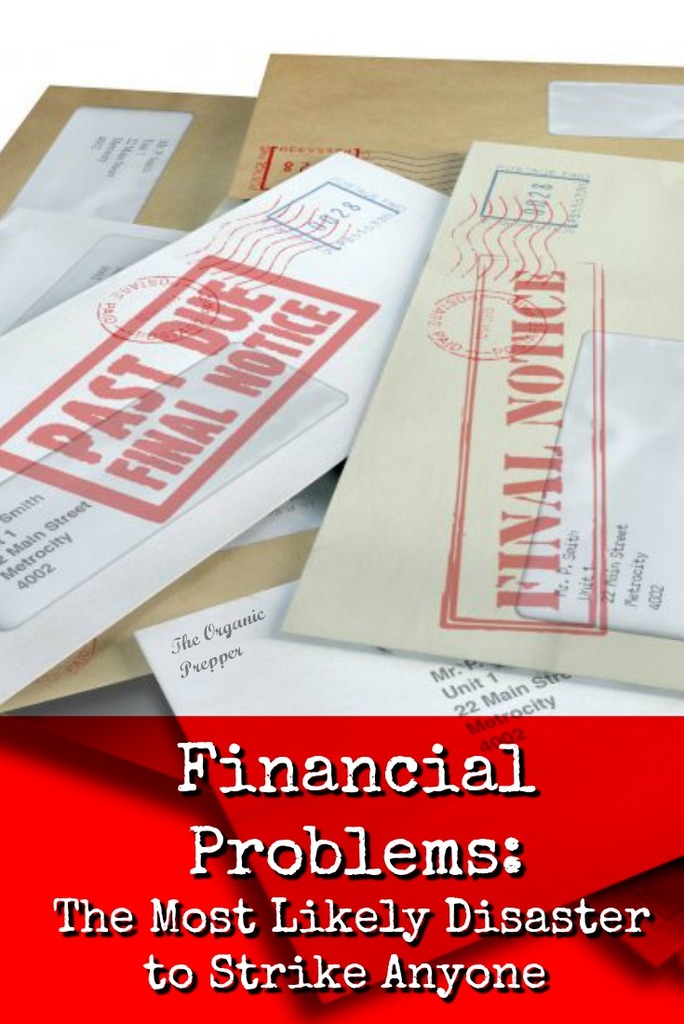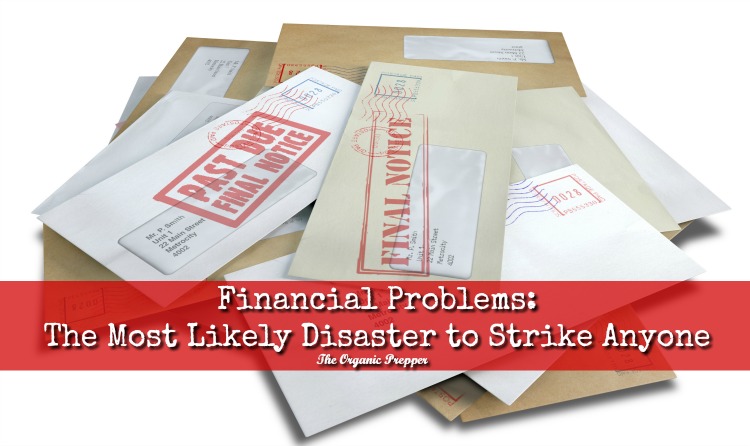If you're new here, you may want to subscribe to my RSS feed. Thanks for visiting!
By Daisy Luther
Preppers think about a lot of doomy, gloomy stuff about various types of apocalypses. After all, disaster is everywhere.
We watch the spread of pandemics, like the pneumonic plague and Ebola. We prepare for hurricanes and wildfires. We keep our eye on events that could turn into episodes of civil unrest, watch the weather for pending snow storms, and have kits to see us through power outages. Every prepper knows about the terrifying threat of an EMP and many of us are well versed in what to do in case of a nuclear strike.
But, there is ONE major disaster that is the most likely to befall any of us at some point in our lives and it isn’t zombies, North Koreans, or the plague.
It’s financial problems.
You may be currently having this issue right now. Maybe you don’t make enough money. Maybe the primary breadwinner has lost his or her job. Maybe someone has massive medical expenses. Maybe there is some other epic expense that you never saw coming.
It doesn’t matter how it happens – it just matters that you see it as something for which you need to prepare. Financially stability is one of the most important preparations you can make.
There are 3 keys to surviving financial problems.
Financially stability doesn’t come from being wealthy. In fact, you can make a million dollars in a year but if you spend a million and one dollars, you aren’t really financially stable.
Instead, financial stability comes from being able to dial back your spending if necessary and deal with a monetary emergency. It comes from being able to pay your bills and have some money left over. It comes from being prepared for that rainy day that we all hope will never happen.
And while having more money definitely helps with this, having more money isn’t always possible. But you can work around this because in most cases it is far easier to spend less than it is to make more. Frugality can completely change your life. (Go here for a free copy of The Preppernomics Report to get dozens of thrifty tips.)
If you focus on the three steps below, you can turn your financial situation around.
#1: Reduce your monthly expenses
We can justify all sorts of frivolous expenditures. Most people are great at saying why they HAVE to live in a super-expensive home or why every member of the family MUST have a cell phone or why they DESERVE an exorbitant recurring expense, but they aren’t very good at cutting those expenses.
The most valuable thing you can do while trying to get your financial feet on the ground is to drop your expenses to rock bottom.
Maybe…
- the kids could share a room
- you could drop to one car
- you could set a grocery budget instead of buying whatever looks tasty at the time
- you could take a walk instead of going to a gym
There are a zillion ways to lower your monthly living expenses. Some of them are a bit more radical, like these. Others are not quite as extreme. Check out this article for an in-depth look at how to reduce your fixed expenses and vow to take action.
The lower your expenses are, the less money you HAVE to make. This is really important because as I mentioned before, it is far easier to control the money you are spending than the money you are making.
#2: Stock up when times are good
When times are good, people tend to go purchase extravagant things that they normally wouldn’t spend money on, like an outrageously expensive outfit, a pricey vehicle, or an exotic vacation. And I agree, it’s very important to reward yourself sometimes. Life shouldn’t always be grim and desperate.
But at the same time, you need to be practical, too, because if one thing is true about money, it’s that there are good times and bad. When the money is rolling in and the expenses are low, stock up on things that you normally need to buy:
- Food for the freezer and pantry
- Paper towels and toilet paper
- Personal hygiene products
- School supplies for the kids
- First aid supplies
Then, during a downturn in your finances, you can use your limited money to pay for necessities.
Once, when I was laid off, I went for 5 months without being able to find another job. The small amount that I received from unemployment insurance was able to keep a roof over our heads, a car in the driveway, and the utilities on. For those months, I hardly had to buy anything for our day-to-day needs because I had a pantry simply loaded with those supplies that had been purchased during better times. As a single parent and the only breadwinner, my pantry was the only reason we didn’t end up homeless.
For more advice on building a pantry when you have limited funds, check out my book, The Pantry Primer: How to Build a Whole Food Pantry on a Half Price Budget.
#3: Build an emergency fund
Hand in hand with stocking up is putting some money back. A recent survey showed that 63% of Americans don’t have enough money to see them through a $1000 emergency. Is this you? If it is, you need to change it, because you are literally one missed paycheck away from disaster.
Think about how easy it is to miss a paycheck. What if you are too sick to work? What if a client fails to pay you? What if the business you are working for suddenly closes its doors?
You should do everything you can to put back at least one month’s worth of expenses – preferably 3 months.
- Sell something
- Get a second job
- Put money back each time you are paid
This is money that is not to be touched except for a true emergency, like the car breaking down, an illness, or a job loss. It isn’t for going to a concert you got invited to at the last minute, funding a vacation, or buying a new outfit.
Trust me, if you need it, it will be an incredible relief to have it. I can tell you this from repeated experience.
If you aren’t making a whole lot of money right now, just putting back $10 a week can really add up – it’s more than $500 over the course of a year. If you’re anything like the rest of the world, you probably blow $10 a week on fancy coffee, magazines, or something else, right?
How can you prepare for financial problems?
Being financially stable is more about your mindset than your income. People with lower incomes can do astounding things with some focus and dedication. For a few ideas about becoming more financially secure, check out this report for dozens of frugal tips.
Remember, no one is immune to financial problems.
What changes can you make to improve your financial stability? Because without financial stability, you’re going to have a hell of a time with life’s unpleasant little surprises.

















6 Responses
Well, this is a timely article for me. As of this month, my health insurance premiums now equal the cost of my housing. God bless Amurrica.
Amazon Prime is now carrying 7 seasons of a Canadian show called “Till Debt Do Us Part.” I have been bingeing on it, it’s like a train wreck you can’t look away from. Pretty consistently, the couples on the show eat out too often, they are eating themselves into poverty, and they withdraw cash almost daily from the ATM but can’t account for how they spent it. This show has made me self-conscious. I am now striving to visit the ATM only once a month and buy food with cash not cards.
One thing I did to ensure financial stability was to arrange for all my bills to be paid automatically out of my checking account. That requires me to maintain a certain amount of “float” money in the checking account, to ensure that all bills always clear. It took a while to save up the “float” money, but putting my bills on automatic pilot gave me peace of mind.
That’s a great idea about the float money, Maggie.
I’m sorry to hear about the health insurance. This is the reason my daughter and I are uninsured. Our premiums would be more than my rent and utilities put together. Meanwhile, we still have to eat and my daughter is in college and we are determined NOT to do student loans. It is so sad that it’s become a choice of either/or with regard to health care.
Good timing for the article. I was just notified that my job will end in April 2018. I will be doing everything possible to improve on my preps in the mean time.
I’m so sorry to hear this. I am glad you have a little bit of warning. Hang in there!
Very good and thoughtful article. But why should medical expenses nearly bankrupt you? Before private insurers demanded that hospitals give them huge discounts, the cost of going to the hospital or the doctor’s was the cost of equipment and time, plus a little extra so the hospital could remain afloat. None of this ‘IV bags now cost over $100 for some salty water in a plastic bag’ or raising the price of vital medications such as EpiPens.
Even without taxpayer funded healthcare, the US should not have to be spending the most money on healthcare for healthcare that is not even the best in the world. 60% of bankruptcies occur because of medical debt. So if you don’t have health insurance, you better have several hundred thousand saved up in case you have a medical emergency that is of no fault of your own.
I am 90 yrs.old, just. My entire life has been based on one supreme thought.,,
” DEBT IS SLAVERY!” And I learned the “hard way”…when serious health problems occur, get out of the country, NOW! H.K. Sanitarium was simply incredible 2 rid me of many, many respiritory problems.CASH! Saved the day. ST.LUKES hospital, Manila, afiliated w/Mayo Clinic, is also superb. Will never leave Manila. Expat tom